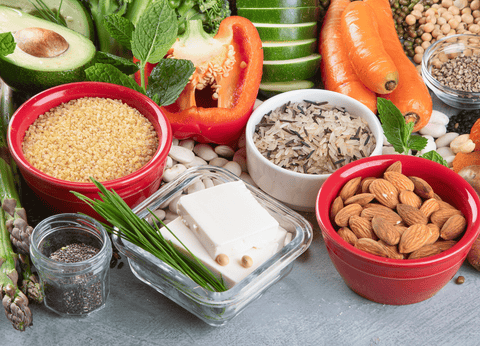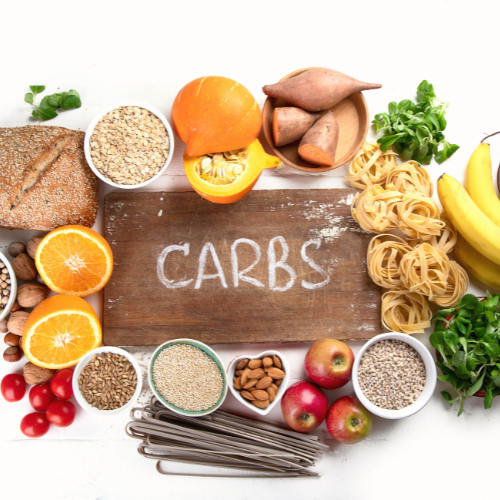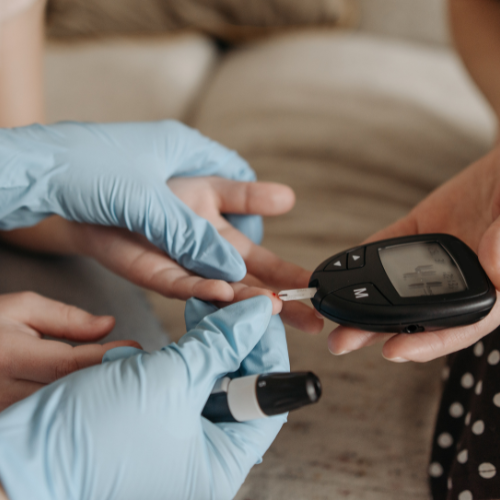When it comes to nutrition, we hear a lot about the importance of protein - and for good reason.
Protein is an essential nutrient needed for the building, maintenance, and repair of almost all tissues in your body, including your bones, muscles, blood, hair, nails, and organs.
It is something you need to eat almost every day, as your body doesn’t store it like it stores fats and carbs. Protein is also a source of energy for your body. It helps keep your immune system strong and keeps you feeling full longer.
Protein is especially important for brain health. It’s needed to produce the neurotransmitters that impact our moods and feelings. It’s also required for getting nutrients to brain cells so we can think clearly, remember important information, and have enough mental energy to complete tasks.
Unfortunately, there’s a lot of confusion out there when it comes to protein.
How much protein do we really need? Could some people be getting too much protein? And is animal protein or plant-based protein better?
Let’s see what the science says.
How Much Protein Do You Need
In the US, the official recommended daily allowance of protein is 0.36 grams of protein for every pound of body weight. In kilos, that’s approximately 0.8 grams of protein per kilogram of body weight.
That means, at 60 kg (roughly 130 pounds), you’d need about 48 grams of protein per day.
However, protein requirements may change depending on age, activity level, or if you’re pregnant or lactating.
Roughly, adults should be getting between 45-80g of protein per day. In developed countries, the average adult is getting 150-200 grams of protein per day, far exceeding the recommended amount!
Protein powders—available as shakes, bars and capsules—are one of the most popular muscle-building supplements. They are marketed products that can help promote your body's muscle growth, aid metabolism and weight loss, reach peak physical performance, boost energy, and fight the aging process. 
Of course, there is some truth to the hype. However, this fad has gone way overboard. Gym junkies and workout fanatics are adding protein powders to their smoothies in the morning and twice a day to their pre and post-workout drinks, on top of their already protein-rich diets.
In 2018, the Clean Label Project tested 134 of the most popular protein powders on the market. They discovered that the vast majority of them (even plant-based, organic protein powders) contained detectable levels of at least one heavy metal, and 55% tested positive for BPA!
Many of them also contain additional sweeteners, flavorings, fillers, preservatives, and gums. Conventional protein supplements are also often made with whey, a dairy protein.
5 Dangers of Getting Too Much Protein
While protein is essential for a healthy functioning body and brain, getting too much protein can cause some serious problems:
1. Weight Gain
While the right amount of protein can help reduce hunger, boost metabolism, and reduce cravings, consuming too much protein can have the opposite effect.
Excess protein consumed is usually stored as fat, while the surplus of amino acids is excreted. This can lead to weight gain over time, especially if you consume too many calories while trying to increase your protein intake.
2. Kidney Disease
Low fluid intake and excessive intake of protein are important risk factors for kidney stones (both calcium and uric acid stones). In addition, high protein intake—particularly, high intake of animal protein—can cause increased intraglomerular pressure and subsequently impair glomerular filtration. This can lead to kidney damage and proteinuria (a high level of protein in your pee).
Studies have shown that long-term high protein intake may lead to de novo chronic kidney disease. Compared with plant protein, animal protein has been associated with an increased risk of end-stage kidney disease.
3. Osteoporosis
Diets high in protein and low in alkali-rich foods generate a large amount of acid in body fluids. The body responds to this by buffering this acid challenge with bone calcium, increasing the risk of bone loss, osteoporosis, and bone fracture.
4. Cancer
Studies show that up to 80% of breast, bowel, and prostate cancers are attributed to dietary practices, particularly a high animal protein diet. This connection appears to be stronger for red meat or processed meat and colorectal cancer.
5. All-cause Mortality
Eating lots of protein, particularly meat and cheese, during middle age could make you nearly twice as likely to die and four times more likely to die of cancer than someone on a low-protein diet—a mortality risk factor comparable to smoking.
As you can see, while protein is essential for a healthy functioning body and brain, too much protein can have some pretty serious effects. You can have too much of a good thing.
But most of the time, it does come down to the type of protein, and this is where a lot of people are getting it wrong.
Animal Protein vs Plant Protein
Animal foods are popular sources of protein, but the research is clear that the harmful effects they have on your health outweigh any benefits of eating these products.
Increased risk of chronic disease and early death
In one of the largest studies (involving more than half a million people!) which was published in the British Medical Journal in May 2017, researchers found that consumption of red meat was associated with an increased risk of death from cancer, heart disease, high blood pressure, stroke, and other cerebrovascular diseases, respiratory disease, infection, kidney disease, chronic liver disease, and diabetes.
Increased risk of diabetes
Diets high in animal protein are associated with an increased risk of diabetes.
As the main animal protein source, studies have shown red meat increases type 2 diabetes risk independent of fat intake due to the impact of heme iron, nitrites, and advanced glycation end products.
On the other hand, according to a 2009 study, those who eat plant-based tend to have lower blood sugar levels, higher insulin sensitivity, and up to a 78% lower risk of developing type 2 diabetes.
Increased risk of cardiovascular disease (CVD)
Meat is high in Advanced Glycation End Products (AGEs). AGEs are damaging compounds that form when sugars combine with protein (amino acids). The consumption of AGEs has been shown to contribute to vascular damage and atherosclerosis. 
On top of the havoc they can wreak on your cardiovascular health, AGEs have also been associated with conditions, such as kidney disease, insulin resistance, and diabetes type 1 and 2. Research has shown AGEs can lead to inflammation and increased oxidative stress by interfering with our cell function, including lipid synthesis, mitochondrial metabolism, and cell signaling.
Animal protein also promotes the growth of unfavorable bacteria that lead to the production of trimethylamine-N-oxide (TMAO), which can cause blockages in the blood vessels of the heart and brain.
In one study that followed 81,337 participants over 6-12 years, the researchers found that the risk of cardiovascular deaths steadily climbed with higher consumption of meat protein and steadily fell with greater consumption of protein from nuts and seeds.
The groups with the highest meat intake were found to have a 60% higher risk of cardiovascular deaths than the groups with the lowest intake. The group that had the highest consumption of nuts and seeds had a 40% lower cardiovascular risk compared to the group with the lowest consumption of nuts and seeds.
Increased risk of cancer
When we consume too much animal protein, the body increases its production of a hormone called IGF-1 (insulin-like growth factor 1). In the early life stages, IGF-1 helps promote growth and development. In adulthood, reduced IGF-1 signaling is associated with decreased oxidative stress, reduced inflammation, enhanced insulin sensitivity, and longer lifespan.
However, in later life, IGF-1 promotes the aging process. Research has shown that elevated IGF-1 levels are linked to an increased risk of several cancers and promote the growth, proliferation, and spread of cancer cells.
Chicken meat is also the biggest source of heterocyclic amines which are chemicals that can cause cancer. A 2010 study which looked at the intakes of various meats and prostate cancer progression, found that men with high prognostic risk and a high poultry intake had a 4-fold increased risk of recurrence or progression.
Increases inflammation
Meat is high in heme iron and studies have shown that heme iron induces a pro-inflammatory environment, as it triggers the production of reactive oxygen species, oxidizes lipids and proteins, and causes DNA damage.
Animal protein also contains pro-inflammatory compounds such as arachidonic acid, saturated fat, and carnitine.
Plant-based Protein For The Win
As you can see, plant protein trumps animal protein in every aspect.
Plant protein—with its health-promoting fiber, phytochemicals, vitamins, and minerals—is the real “protein package.” It provides all the essential amino acids you need and also reduces the risk of disease and extends lifespan.
A team of researchers at the U.S. National Institutes of Health's National Cancer Institute wanted to know if eating animal versus plant-based protein made a difference in longevity. 
To find out, they compiled data from over 400,000 people aged 50 to 71 over 16 years. Results showed that those people—male or female, who consumed more than average amounts of plant-based protein—had a 5% lower than average mortality rate.
They also found that the more plant-based proteins a person ate, the longer they tended to live. In addition, swapping just 3% of the animal-based protein in their diets for plant-based proteins provided a 10% reduction in mortality risk.
Another review of 32 studies found that intake of plant protein was associated with a reduced risk of death by cardiovascular causes, such as heart attacks and strokes.
Research has also found many cancers can currently be prevented by eating a plant-based diet every day. This kind of diet can alter the process of carcinogenesis (cancer growth). Food influences our immune system and growth factors such as insulin, which can contribute to cancer growth. Food also affects our ability to combat free radicals and oxidative stress, and it can even influence genes that signal cancer cell death.
Can you get enough protein on a plant-based diet?
Absolutely!
One of the biggest myths that have circulated is that one can’t reach their protein requirements on a plant-based diet.
Amino acids are the building blocks of protein. Protein is made up of 21 amino acids, but your body can make only 12 of them. Nine of these are essential because you need to get them directly from your food.
As long as you’re eating a variety of whole, natural foods and enough so you don’t lose weight, it’s almost impossible to consume too little protein.
There is no evidence that supports that someone who eats a wide variety of plant-based foods won’t meet their nutritional protein requirements. In fact, even athletes can meet their protein needs on a plant-based diet! In developed countries, protein deficiency is virtually non-existent!
How to work out your protein needs
To work out your protein needs, you can use an app like cronometer.
There is also a simple formula you can use to work out how much protein you should be getting on a daily basis:
- Find your “P” value.
- Kids ages 4 to 13 = 0.43
- Adolescents ages 14 to 18 = 0.39
- Adults ages 19 to 64 (moderately active) = 0.36
- Seniors ages 65+ and special needs (i.e. pregnant women) = 0.44 to 0.522
- Multiply your lean body weight (in pounds) by your “P” value to calculate your protein needs. If you are significantly overweight, you may adjust the formula depending on what you may consider a healthy body weight.
Make sure you choose different sources of plant-based protein to get as many different amino acids as you can. Also, each protein source contains different minerals and vitamins so diversity is key!
Healthy Plant-Based Protein Sources
Grams of protein per serving:
Nuts and Seeds: 1 ounce/30 grams
- Walnuts: 4.5 grams
- Almonds: 6 grams
- Cashews: 4.5 grams
- Chia seeds: 6 grams
- Flaxseed: 6 grams
- Hemp seeds: 9.5 grams
- Sunflower seeds: 5.5 grams
- Pumpkin seeds: 8.5 grams
Legumes: ½ cup/80 grams
- Black beans: 8 grams
- Pinto beans: 7 grams
- Chickpeas: 7.5 grams
- Kidney beans: 8 grams
- Lentils: 8 grams
- Peas: 8 grams
Soy Foods: 3 ounces/100 grams
- Tofu: 4 grams
- Tempeh: 13 grams
- Edamame: 17 grams
Grains: ½ cup cooked/100 grams
- Quinoa: 4.5 grams
- Brown rice: 3.5 grams
- Amaranth: 4.7 grams
- Millet: 3.5 grams
- Oats: 3 grams
- Spelt: 6 grams
The science is unequivocal.
So, next time someone tries to tell you that you can't get enough protein on a plant-based diet or that plant-based protein is inferior to animal protein, set them straight.
With a little bit of knowledge and some easy swaps, it's easy to incorporate plenty of high-quality plant-based protein into your meals. There are plenty of delicious options that will help you meet your daily protein goals. If you’re looking for an easy way to make a big impact on your health, consider making the switch to plant-based protein today.
Recipe Spotlight: Eggplant and Chickpea Stew
One of the more common misconceptions about plant-based meals is that the taste will be compromised. Seeds, legumes, nuts, and grains can, in fact, be bland for those who aren’t used to eating these alternative protein sources.
So to make this more fun for you, here’s an entree recipe that adds a mouthwatering combo of spices to eggplant and chickpeas. It’s low in cholesterol and gluten-free, yet it’s bursting with flavor that you’d forget this is completely vegan!
Once you’ve made this, let us know how it goes in the comments below. Enjoy!















What Do You Think? Comment Below: